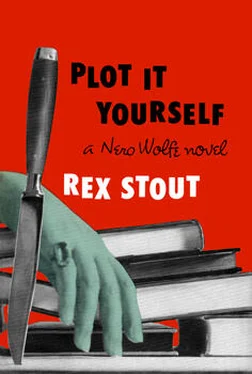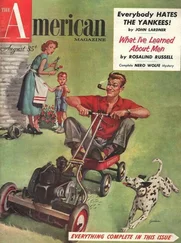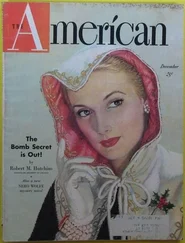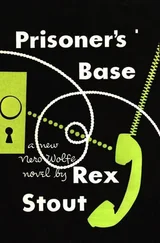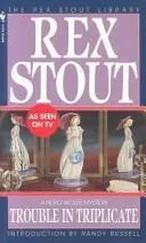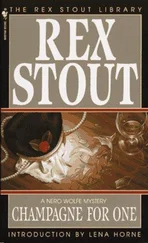At a quarter to ten Thursday morning I braked the Heron sedan to a stop in front of 78 Haddon Place, Riverdale. Perhaps that wasn’t “as early as may be,” but I didn’t want to tackle her before she had had breakfast, and besides, I hadn’t been able to get the photograph until Lon got to the Gazette office at nine o’clock. As I was soon to learn, it didn’t matter anyway, since she had already been dead about twelve hours.
If it had been a nice sunny morning I might have gone around to the side for a look at the terrace where I had found her before, but it was cloudy and cool, so I went up the walk to the entrance and pushed the button. The door was opened by a DAR type, a tall, upright female with a strong chin, in a gray dress with black buttons. Unquestionably the mother under whose devotion Jane had once been suffocating and probably still was.
“Good morning,” she said.
“Good morning,” I said. “My name is Archie Goodwin. Are you Mrs. Ogilvy?”
“I am.”
“I would like to see your daughter, Miss Jane Ogilvy.”
“Does she know you?”
“We have met. She may not recognize the name.”
“She is in the cloister.”
Good Lord, I thought, she has taken the veil. “Cloister?” I said.
“Yes. She may not be up yet. Go around the house to the left and from the terrace take the path through the shrubbery.” She backstepped and was closing the door.
I followed directions. I had a feeling that I might have known she had a cloister — a cloister felt though not perceived. Rounding the house to the terrace, which was deserted, I took a graveled path which disappeared into bushes that gave it a roof. After winding among the bushes for some distance it left them and straightened out to pass between two big maples to the door of a small building — one story, gray stone, sloping roof, a curtained window on each side of the door. I proceeded and used the knocker, a big bronze flower with a red agate in the center. When nothing happened I knocked again, waited twenty seconds, turned the knob, found the door wasn’t locked, opened it a couple of inches, and called through the crack, “Miss Ogilvy!” No response. I swung the door open and stepped in.
It was a fine well-furnished cloister and probably contained many objects that were worth a look, but my attention centered immediately on its tenant. She was on her back on the floor in front of an oversized couch, dressed in a blue garment that I would call a smock but she probably had called something else. One of her legs was bent a little, but the other one was out straight. Crossing to her, I stooped to get her hand and found that the arm was completely stiff. I got a foot, which was covered by a sock but no shoe; the leg was stiff too. She had been dead a minimum of six hours, and almost certainly more.
There was a dark red stain at heart level around a slit in the smock, not a big one. My hand started to open the zipper for a look underneath. But I drew it back. Let the medical examiner do it. I straightened up and looked around. There was no sign of a struggle or of any disturbance — no drawers open or anything scattered around. Everything was as it should be except that she was dead.
I said aloud, with feeling, “The sonofabitch.”
There was a phone on a table against a wall, and I went and lifted the receiver, using my handkerchief, and put it to my ear. The dial tone came. There was a chance that it was an extension, but probably not; the number on the disk was not the same as the one listed for Ogilvy in the phone book. I dialed and got Fritz, and asked him to buzz the plant rooms.
Wolfe’s voice: “Yes?”
I apologized. “I’m sorry to disturb you so often when you’re up with the orchids, but I’ve hit another snag. I’m in a building in the rear of the Ogilvy grounds which Jane called the cloister. Her corpse is here on the floor. Stabbed in the chest. She died at least six hours ago, probably more. At the house her mother told me she was here and might not be up yet, and I came here alone. I have touched nothing but the knocker and the doorknob. If you want me to hurry home for new instructions, okay, I knocked a few times and got no response, and left. I can stop at the house and tell Mrs. Ogilvy that.”
He growled, “If you had gone last night.”
“Yeah. Maybe. She was probably killed about the time I started trying to find Lon Cohen. If I leave I should leave quick.”
“Why leave? How in the name of heaven could I have new instructions?”
“I thought you might want to discuss the situation.”
“Pfui. Discussion wouldn’t help it any.”
“Then I stick.”
“Yes.”
He hung up. I cradled the phone, considered for half a minute, stepped to the door and on out, shut the door, wiped the knob with my handkerchief, followed the path back to the house and around to the front entrance, and pushed the button. Again the door was opened by the devoted mother.
“I’m sorry to bother you again,” I said, “but I thought I ought to tell you. Miss Ogilvy doesn’t seem to be there. I knocked several times, and knocked loud, and got no response.”
She wasn’t alarmed. “She must be there. She hasn’t been in for breakfast.”
“I knocked hard.”
“Then she’s gone somewhere. There’s a lane in back of the cloister, and she keeps her car there.”
“Gone without breakfast?”
“She might. She never has, but she might.”
I took a chance. It was highly unlikely that X had gone off with her car. “What make is her car?”
“Jaguar.”
“It’s there. I looked around a little and saw it. I think you ought to come and see, Mrs. Ogilvy. She might have had a stroke or something.”
“She doesn’t have strokes. I never go to the cloister.” She tightened her lips. “But perhaps I should— All right. You come along.”
She crossed the sill and shut the door, and I moved aside to let her by. She strode like a female sergeant, around to the terrace and across it, and along the path. When she reached the door of the cloister she started her hand for the knob, but changed her mind and raised it to the knocker. She knocked three times, at intervals, turned her head to look at me, grabbed the knob and opened the door, and entered. I followed. In three steps she saw it and stopped. I said something, went on by, on to it, squatted, and touched an arm. I unzipped the smock, spread it open, and took a look.
I stood up. Mother hadn’t moved, except that her mouth was working. “She’s dead,” I said. “Stabbed in the chest. She has been dead quite a while.”
“So she did it,” Mrs. Ogilvy said.
“No. Someone else did it. There’s no weapon.”
“It’s under her. It’s somewhere.”
“No. If she did it and pulled the weapon out, still alive, there would be a lot of blood, and there is almost none. It was pulled out after her heart stopped.”
“You know a lot about it.”
“I know that much. Will you call the police or shall I?”
“She did it.”
“No. She did not.”
“Who are you?”
“My name is Archie Goodwin. I’m a private detective. I’ve had some experience with death by violence.”
“Do you mean she was murdered?”
“Yes.”
“Are you sure?”
“Yes.”
“Thank God.” She turned her head, saw a chair, went to it, and sat. She started to slump, then jerked her shoulders back. “Then you must call the police?”
“Certainly.” I had moved to face her. “It might help if I could give them some information on the phone. Could you answer a few questions?”
“If I choose to.”
“When did you last see your daughter?”
“When she left the house last evening to come here.”
Читать дальше
